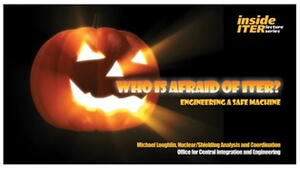Who is afraid of ITER? (video)
In last week's Inside ITER seminar entitled "Who's afraid of ITER?", Nuclear Analysis and Shielding Coordinator Michael Loughlin addressed the fears—both rational and irrational—that construction of the ITER experimental fusion facility may engender in the public mind. "As an engineer on the inside," he said at the beginning of his presentation, "I understand how the facility will function, but others may not. People wonder 'Is there a risk of explosion?' 'Can air or water become contaminated?'"
Turning to the first question, Loughlin stressed that ITER won't contain the type of nuclear fuel such as plutonium and uranium that is associated in the public mind with danger of run-away reaction and explosion. During operation, the ITER Tokamak chamber will contain only a tiny amount, less than one tenth of a gram, of hydrogen fuel at any given moment. If disruption occurs during a pulse, the reaction cools and ends. "A nuclear explosion in ITER is simply not possible," says Loughlin.
Loughlin went on to address the subject of radioactivity. During fusion, neutrons escape the plasma at high speeds and activate the surrounding walls. The behaviour of these neutrons is random: some bounce off atoms in the walls, lose energy and decay; some meet no resistance and head straight through the wall; and others either get absorbed by an atom, or split it into two (see featured video Newsline 99). Loughlin and the nuclear shielding team at ITER use computer modelling to map the probabilities of neutron radiation across different areas of the ITER Tokamak—port, blanket, divertor—in order to design the best possible radiation shielding.
Like Russian dolls—where each doll rests inside a larger one—the facility is engineered to keep the materials with the highest radioactivity in the very centre of the complex, surrounded by multiple protective layers. Maintenance and refurbishment of parts is performed through remote handling. A two metre-thick concrete wall, or "bioshield" surrounds the Tokamak to protect workers and the environment. Openings in the bioshield for diagnostics and remote handling are fitted with "plugs" to prevent radiation from escaping, plus further shielding systems.
Protective measures like these will keep radiation escaping from the ITER Tokamak to a minimum. Current estimates situate the level at .01 mSv (millisieverts) and engineers are working to decrease this further. This can be compared to the radiation dose received from a dental xray (.1 mSv) or natural background radiation (2.4 mSv).
Loughlin concluded his presentation by describing ITER's overall approach to safety. "Whether we're taking about designing, operating, or monitoring the machine—our safety approach can be summed up as 'defence-in-depth.' It includes multiple physical layers of protection, filtering systems, extensive monitoring, and automatic safety systems. All ITER is permeated by a very strong safety culture ... there is no reason to be frightened of ITER!"
Watch "Who is afraid of ITER" here.


